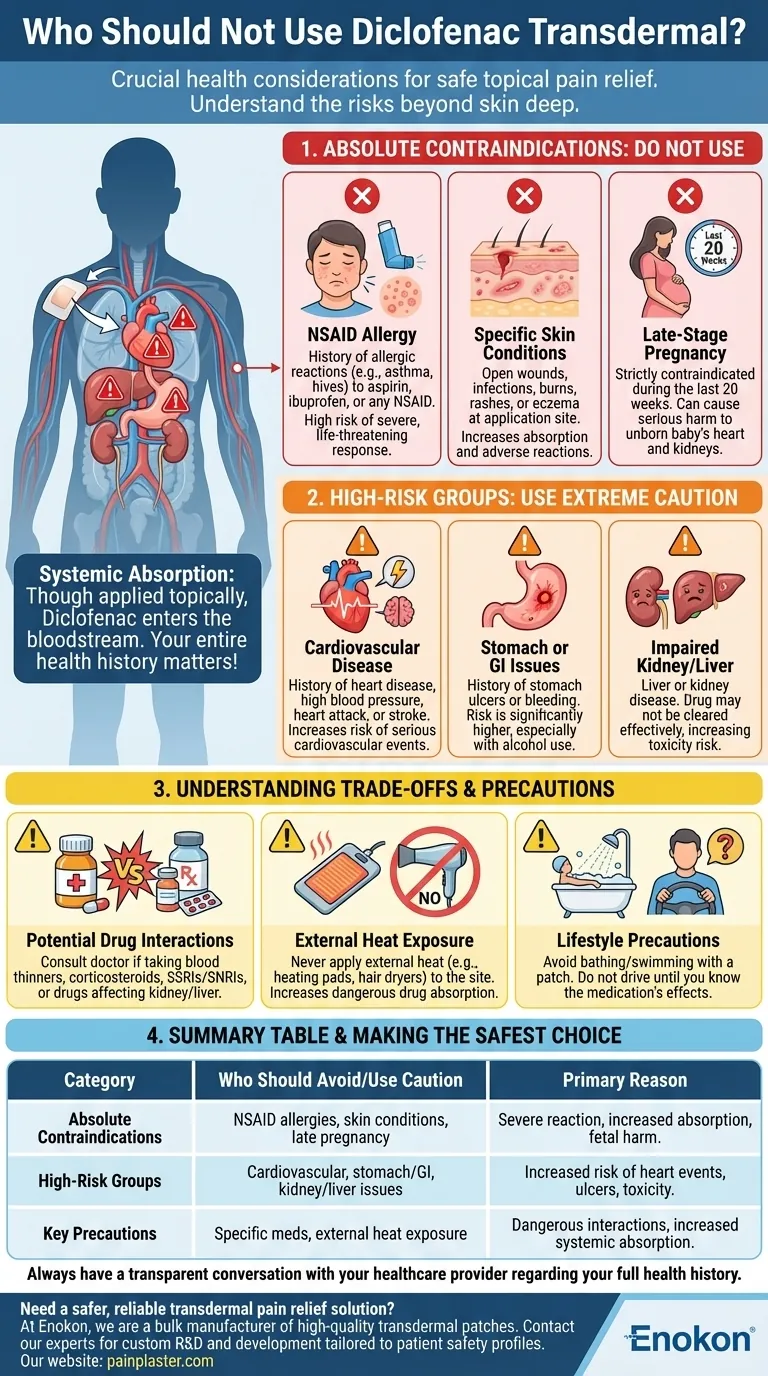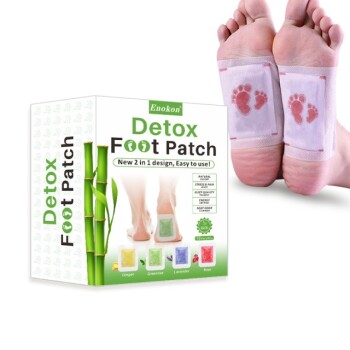Certain individuals should strictly avoid using diclofenac transdermal due to significant health risks. This includes anyone with a known allergy to diclofenac or other nonsteroidal anti-inflammatory drugs (NSAIDs), those with specific skin conditions like open wounds or eczema at the application site, and women in the last 20 weeks of pregnancy.
While transdermal diclofenac is applied to the skin for localized relief, it is absorbed into the bloodstream. This means your entire health history, not just the condition of your skin, is critical for determining if it is a safe option for you.

Absolute Contraindications: Who Must Avoid Diclofenac
Some conditions make the use of diclofenac transdermal unacceptably risky. If you fall into any of these categories, you should not use this medication.
History of Allergic Reactions
You must avoid this product if you have ever had an allergic reaction, asthma attack, or other severe response after taking aspirin or another NSAID (like ibuprofen or naproxen). The risk of a similar, potentially life-threatening reaction is high.
Specific Skin Conditions
Do not apply diclofenac patches or gel to skin that is not intact and healthy. This includes areas with open wounds, infections, burns, rashes, or eczema. Applying the medication to compromised skin can increase absorption and lead to adverse reactions.
Late-Stage Pregnancy
Diclofenac is strictly contraindicated during the last 20 weeks of pregnancy. NSAID use during this period can cause serious harm to the unborn baby's heart and kidneys.
High-Risk Groups: Who Must Use Extreme Caution
For some individuals, diclofenac is not absolutely forbidden but requires a careful discussion with a healthcare provider because the risks are elevated.
Individuals with Cardiovascular Disease
If you have a history of heart disease, high blood pressure, heart attack, or stroke, using diclofenac can increase your risk of serious cardiovascular events. Even topical forms carry this warning.
History of Stomach or GI Issues
NSAIDs, including diclofenac, are known to increase the risk of stomach ulcers and bleeding. If you have a history of these conditions, the risk is significantly higher. Heavy alcohol use while using diclofenac further elevates this risk.
Impaired Kidney or Liver Function
Your kidneys and liver are responsible for processing and clearing medications from your body. If you have liver or kidney disease, the drug may not be cleared effectively, increasing the risk of toxicity and side effects.
Understanding the Trade-offs and Precautions
Using any medication involves weighing the benefits against the potential risks. Understanding these factors is key to using diclofenac safely.
Risk of Systemic Absorption
The primary trade-off of a topical medication is convenience versus systemic risk. While it targets a local area, a portion of the drug enters your bloodstream. This is why conditions like heart and kidney disease are still major concerns.
Potential Drug Interactions
Diclofenac can interact negatively with other medications. Be especially cautious and consult your doctor if you take blood thinners (e.g., warfarin), corticosteroids, certain antidepressants (SSRIs/SNRIs), or other drugs that affect kidney or liver function.
Critical Usage Guidelines
To minimize risks, never expose the application site to external heat sources like heating pads or hair dryers, as this can increase drug absorption. Avoid bathing or swimming while wearing a patch. Do not drive until you know how the medication affects you.
Making the Safest Choice for Your Health
Your health history is the most important factor in determining if diclofenac transdermal is right for you. Always have a transparent conversation with your healthcare provider.
- If your primary focus is safety with a known NSAID allergy: You must avoid diclofenac and all other NSAIDs entirely.
- If your primary focus is managing pain with cardiovascular or GI risk factors: You must consult a doctor to see if the benefits outweigh the significant potential risks.
- If you are pregnant or may become pregnant: Diclofenac should be completely avoided in late pregnancy and used only with a doctor's explicit approval at other stages.
Ultimately, your safety depends on a full and honest disclosure of your health conditions and medications with your provider.
Summary Table:
| Category | Who Should Avoid / Use Extreme Caution | Primary Reason |
|---|---|---|
| Absolute Contraindications | Individuals with NSAID allergies, certain skin conditions, or in late-stage pregnancy. | High risk of severe allergic reaction, increased absorption, or fetal harm. |
| High-Risk Groups | Individuals with cardiovascular disease, stomach/GI issues, or impaired kidney/liver function. | Increased risk of heart events, ulcers/bleeding, or drug toxicity. |
| Key Precautions | Individuals taking specific medications (e.g., blood thinners) or using external heat on the application site. | Risk of dangerous drug interactions or increased systemic absorption. |
Need a safer, reliable transdermal pain relief solution?
At Enokon, we are a bulk manufacturer of high-quality, reliable transdermal patches and pain plasters. We understand that patient safety is paramount. If you are a healthcare or pharma distributor or brand looking for custom R&D and development of pain management solutions tailored to specific patient populations and safety profiles, our technical expertise is here to help.
Contact our experts today to discuss your custom transdermal patch needs.
Visual Guide

Related Products
- Asthma Cough and Pain Relief Patch for Adults and Kids
- Far Infrared Deep Heat Relief Patches Medicated Pain Relief Patches
- Far Infrared Heat Pain Relief Patches Transdermal Patches
- Heating Pain Relief Patches for Menstrual Cramps
- Far Infrared Pain Patch Relief Pain Reliever for Back
People Also Ask
- Are pain relief patches safe for sensitive skin? Your Guide to Safe Use & Skin Testing
- What role do natural ingredients and acupoint stimulation play in a cough relief patch? Synergistic Relief Explained
- What are the key benefits of using the cough relief patch? Soothe Your Cough with Targeted, Non-Oral Relief
- How does the cough relief patch provide targeted relief? Direct, Soothing Comfort for Coughs & Chest Congestion
- How does capsaicin work in the Reliever Patch? A Drug-Free Solution for Targeted Pain Relief
















